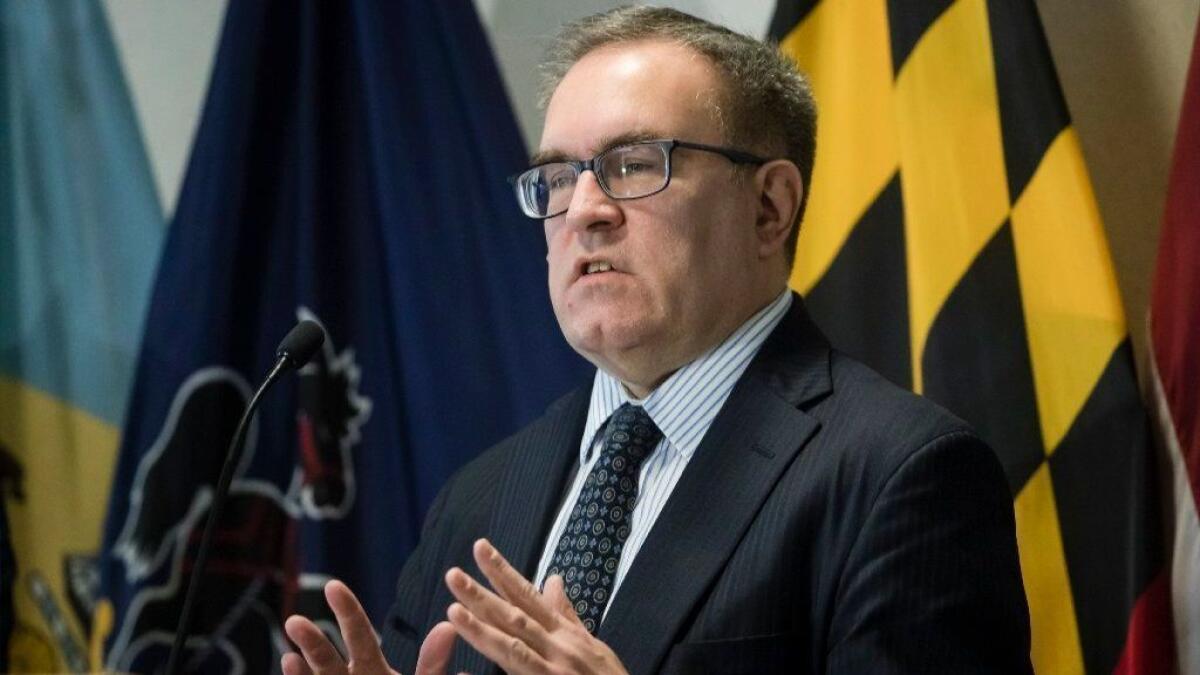Senate confirms former coal lobbyist Andrew Wheeler as EPA administrator

Reporting from Washington — The Senate on Thursday confirmed Andrew Wheeler to lead the Environmental Protection Agency, handing the reins of the agency responsible for ensuring clean air and safe drinking water to a former coal industry lobbyist.
The 52-to-47 vote removed the word “acting” from Wheeler’s title, installing him as the agency’s full-fledged administrator.
But it left the EPA’s recent focus unchanged. Under Wheeler, it is expected to continue its anti-regulatory crusade that has made it the nemesis of environmental groups and put it in constant conflict with states such as California that are leading the push to abandon fossil fuels.
Wheeler assumed control of the agency on an interim basis in July 2018 after President Trump chose him to replace former Administrator Scott Pruitt, who resigned under a cloud of federal investigations. Scrutiny of Pruitt’s lavish spending of taxpayer money and the use of his position to enrich his family turned him into a political liability. When the spotlight became too intense, it fell to his deputy to continue Trump’s agenda of rolling back Obama administration environmental regulations.
Under Wheeler, the EPA has introduced a variety of proposals favored by the industries it regulates.
They include a proposed repeal of the Clean Power Plan, which sets limits on carbon emissions from coal and gas-fired power plants, and a push to weaken the Mercury and Air Toxics Standards regulation by assigning more importance to the costs incurred by corporations and less to the potential health benefits of air pollution restrictions.
Another of the agency’s proposals would strip federal protections from millions of acres of waterways and wetlands, including up to two-thirds of California’s inland streams.
Most Republicans continue to support these policies, but the aggressive anti-regulation push has cost Wheeler the backing of some of the more moderate senators who voted a year ago to confirm him as deputy administrator.
Republican Sen. Susan Collins of Maine voted against his confirmation.
“I believe that Mr. Wheeler, unlike Scott Pruitt, understands the mission of the EPA and acts in accordance with ethical standards,” Collins wrote on Twitter. “[H]owever, the policies he has supported as acting administrator are not in the best interest of our environment and public health, particularly given the threat of climate change to our nation.”
All Democrats voted no, including Sen. Joe Manchin III, a centrist from West Virginia and a defender of the coal industry.
A longtime Washington insider, Wheeler has often been viewed as a more disciplined version of his former boss. Pruitt’s rush to undo long-standing rules and his lack of familiarity with the complicated process of rewriting regulations led to a raft of lawsuits, many of which succeeded in delaying or stopping his initiatives.
For this reason, some of Wheeler’s foes in environmental advocacy groups worry that he may be a more formidable opponent.
Still, he faces an array of challenges.
Democrats’ control of the House has placed the EPA’s efforts to dismantle clean-water and -air rules under a harsh spotlight.
There has been renewed attention on the agency’s declining enforcement actions, including significant drops in some of the penalties levied against polluters.
The climate crisis, which Wheeler has essentially pushed to the back of the agency’s to-do list, has also been front and center in the new Congress. House Democrats have held a series of hearings focused on global warming and the urgency of reducing greenhouse gas emissions to help prevent catastrophic floods, wildfires and droughts.
The result is a stark contrast between the everything-is-fine messages coming out of the federal agency tasked with environmental protection and lawmakers in the House who believe the EPA has been captured by fossil fuel interests.
At his Senate confirmation hearing, Wheeler showed no sense of urgency to address climate change.
“I would not call it the greatest crisis … ,” he told senators. “I consider it a huge issue that has to be addressed globally.”
In the latest example of the difficulties that lie ahead, the Trump administration recently decided to end already faltering talks with California aimed at resolving a dispute over fuel-economy standards. The next stop is likely to be a long legal battle that could continue beyond the 2020 presidential election.
California officials have said they are prepared to go to court to defend the state’s power to set its own, stricter pollution standards for cars and light trucks. Years of litigation could tie up the EPA’s plans to weaken the existing standards and anger car manufacturers caught in regulatory chaos.
Wheeler has spent more than two decades in Washington.
He began his career at the EPA in the 1990s, under former President George H.W. Bush, before shifting to politics.
He spent 14 years advising Sen. James M. Inhofe, one of the most prominent and vocal climate change deniers in Washington. The Oklahoma Republican famously brought a snowball onto the Senate floor to debunk global warming.
Later, Wheeler became a lobbyist, often working behind the scenes to advance the interests of coal, oil and gas companies. At the lobbying firm of Faegre Baker Daniels, his top client was Robert Murray, chief executive of Murray Energy Co., the largest privately held coal company in America.
During the presidential campaign, Murray emerged as a major supporter of Trump. He later delivered an “action plan” to the White House, laying out a four-page wish list of the environmental and mine safety regulations he wanted to see unwound.
Speaking from the Senate floor on Thursday, Inhofe urged his colleagues to confirm Wheeler.
“There’s no one more qualified anywhere in America to handle this job than Andrew Wheeler,” he said. “He’ll be a good steward of the environment without punishing our states, without punishing our farmers, without punishing our job creators.”
More stories from Anna M. Phillips »
More to Read
Get the L.A. Times Politics newsletter
Deeply reported insights into legislation, politics and policy from Sacramento, Washington and beyond. In your inbox three times per week.
You may occasionally receive promotional content from the Los Angeles Times.











